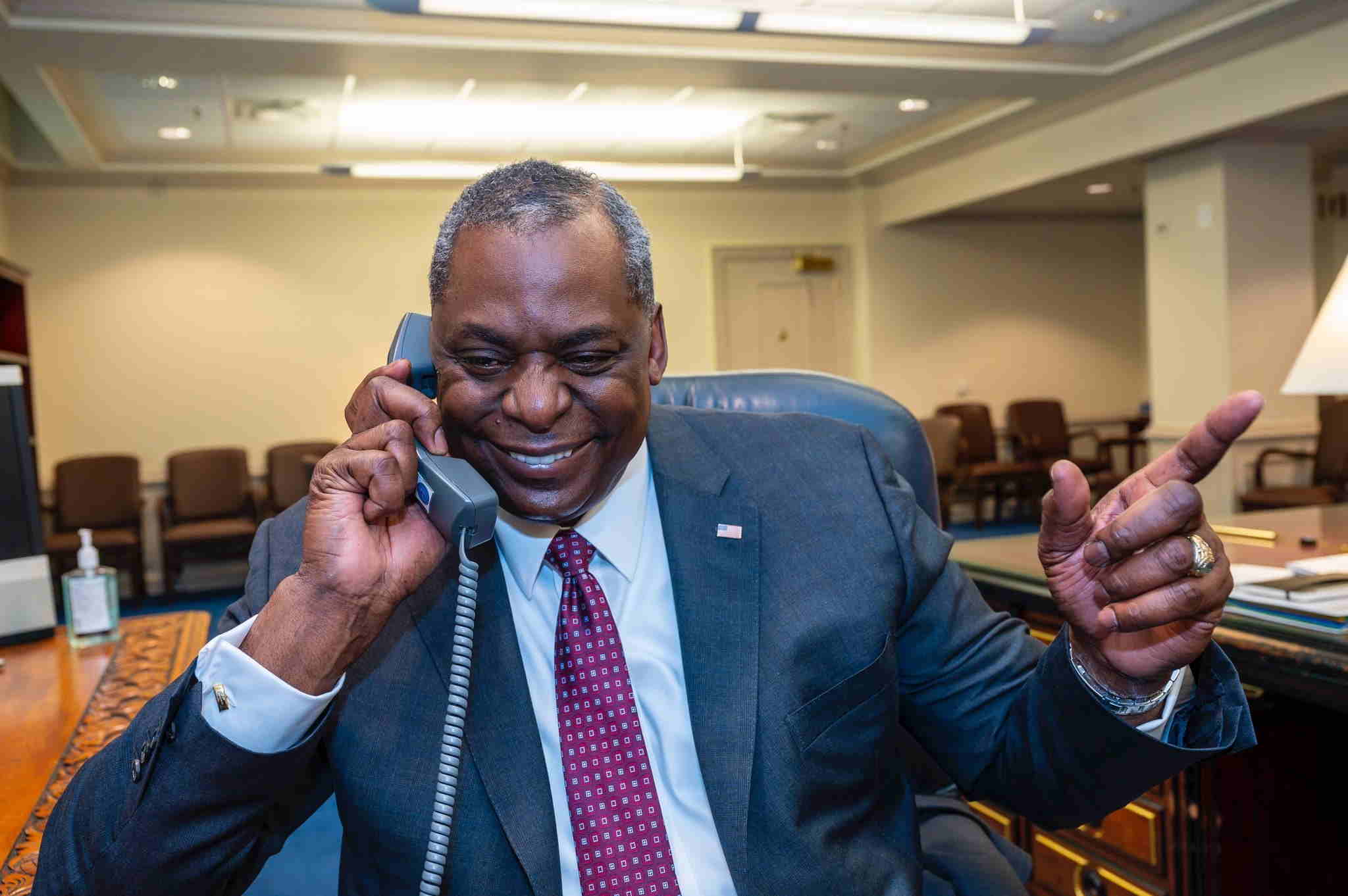

Secretary Austin, in his conversation with Indian Defence Minister Rajnath Singh, noted the great strides made in the US-India defence relationship (Image courtesy: Twitter/@SecDef)
<p>
<strong>In the first high-level engagement between the Indian government and the new Joe Biden administration, Defence Minister Rajnath Singh received an introductory telephone call from the newly-appointed US Secretary of Defence Lloyd Austin and the National Security Advisor (NSA) Ajit Doval had a conversation with his US Counterpart Jake Sullivan, Wednesday night.</strong></p>
<p>
During their talk, Rajnath and Austin reaffirmed their commitment to work together to strengthen the &#39;multifaceted&#39; India-US defence cooperation and the strategic partnership.</p>
<p>
&quot;Spoke with my US counterpart, @SecDef Austin and conveyed my warm wishes on his appointment. We reiterated our firm commitment to deepen India-US defence cooperation. We exchanged views on regional and global issues of mutual interest to strengthen our strategic partnership,&quot; the Indian defence minister tweeted after the call.</p>
<p>
A statement released by the Pentagon said that during the call, Secretary Austin emphasized the Department&rsquo;s commitment to the US-India Major Defence Partnership, observing that it is built upon shared values and a common interest in ensuring the Indo-Pacific region remains free and open.</p>
<p>
Secretary Austin noted the great strides made in the US-India defence relationship, and he pledged to work collaboratively with the Defence Minster to sustain progress.</p>
<p>
&quot;Had a great call with the Minister of Defence of India, @rajnathsingh. We affirmed our commitment to bilateral cooperation and pledged to sustain momentum in growing defence cooperation. Looking forward to a productive relationship,&quot; Austin said in his reply to Rajnath&#39;s tweet.</p>
<p>
Meanwhile, National Security Adviser Ajit Doval congratulated his US counterpart Jake Sullivan and conveyed his best wishes on his appointment.</p>
<p>
NSA Doval underscored that as leading democracies, with an abiding faith in an open and inclusive world order, India and the US were uniquely positioned to work closely on regional and international issues including combating the scourge of terrorism, maritime security, cyber security and peace and stability in the Indo-Pacific region and beyond.</p>
<p>
NSA Sullivan stated that the US was looking forward to working together on the bilateral agenda and the common global challenges.</p>
<p>
The two NSAs agreed to work closely to further advance India-US relations, which are built on shared values and common strategic and security interests. They highlighted the need to work collectively to address challenges in the post-Covid era and further expand the Comprehensive Global Strategic Partnership.</p>
<p>
India and the United States have made great strides to advance strategic partnership in the past few years, rattling Pakistan and China on many occasions.</p>
<p>
After the Logistics Exchange Memorandum of Agreement (LEMOA) in 2016, the Communications Compatibility and Security Agreement (COMCASA) in 2018 and the Industrial Security Annex (ISA) in 2019, the signing of the Basic Exchange and Cooperation Agreement (BECA) last year took the growing friendship between the two nations to a new high.</p>
<p>
BECA &mdash; which is related to sharing of geospatial intelligence information &mdash; was the last of the four military communication foundational agreements waiting to be signed between India and the US.</p>
<p>
&quot;We agree that the US-India Comprehensive Global Strategic Partnership is critical to the security and prosperity of both our countries, the Indo-Pacific region, and the world,&quot; the then US Secretary of State Mike Pompeo had said last October.</p>
<p>
It came against the backdrop of the 2+2 Ministerial meeting mechanism of the Foreign and Defence Ministers of India and the United States and the India-US-Australia-Japan Quadrilateral consultations which saw militaries of the four countries in the Quad group participating in the &quot;high-end military exercise&quot; Malabar 2020 in the Indian Ocean Region.</p>
<p>
Pompeo and (now former) US Secretary of Defence Mark Esper&#39;s India trip had set off considerable fear and trepidation in Islamabad and Beijing which saw the developments having &quot;serious repercussions&quot; for peace and stability in South Asia.</p>
<p>
&quot;This defence deal is apparently aimed to counter the growing influence of China in the region, but we fear that India&#39;s military build-up will ultimately be used against Pakistan. Pakistan should develop a cogent defence partnership with China to boost its military arsenal and be ready to respond to any aggression by India,&quot; retired Pakistani Army Lt-General Amjad Shoaib had told Arab News Pakistan.</p>
Australia's High Commissioner to India, Philip Green OAM, called Yoga one of India's gifts to…
The Bharat Sanchar Nigam Limited (BSNL) has announced the soft launch of BSNL Quantum 5G…
The Indian Embassy in Iran has said that the embassy will make efforts to evacuate…
India's gross direct tax collections for the financial year 2025-26 rose by 4.86 per cent…
Russian President Vladimir Putin has said that Moscow is not seeking Ukraine's unconditional surrender, but…
Extending his greetings on the 11th International Day of Yoga, Lok Sabha speaker Om Birla…